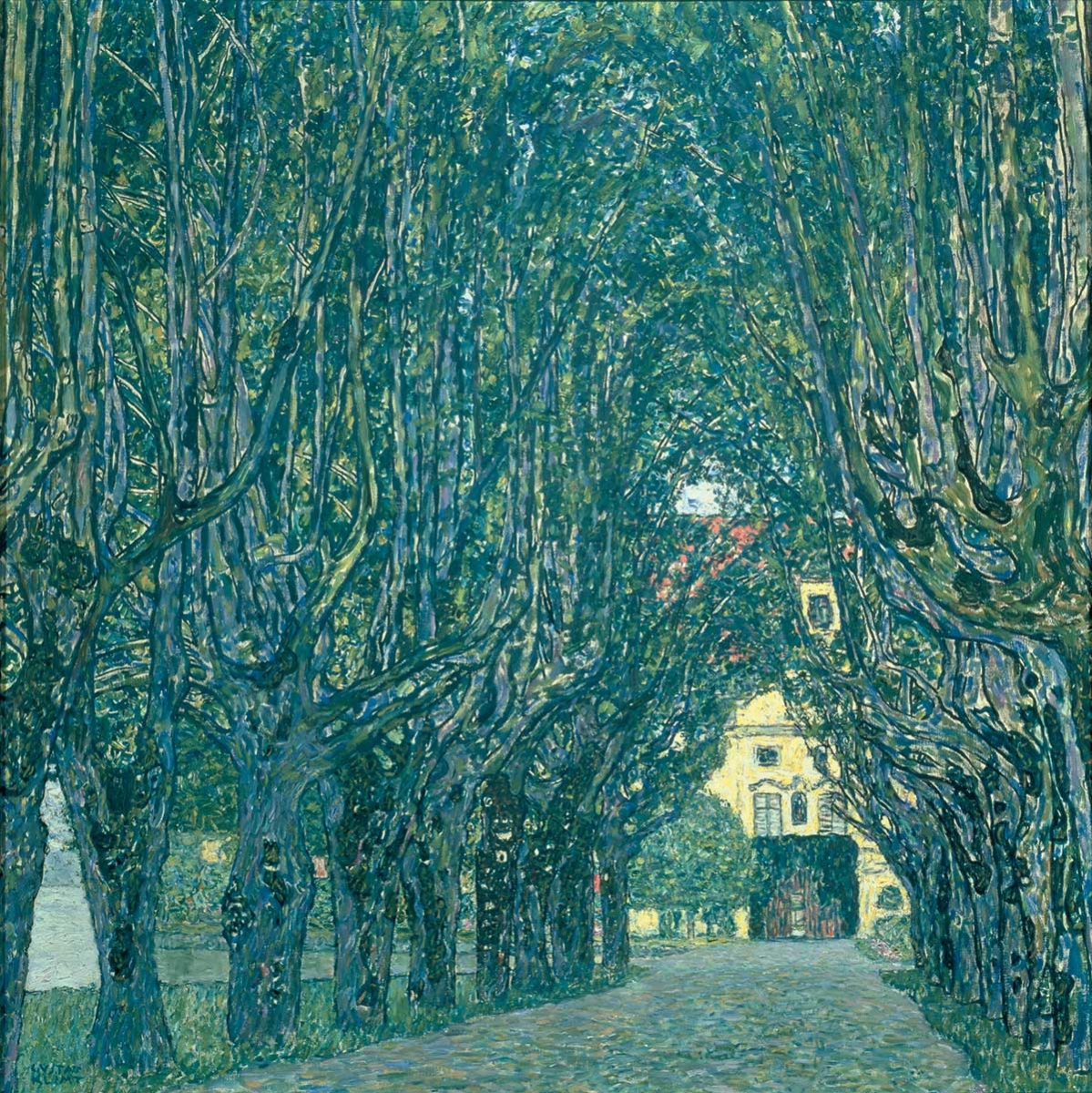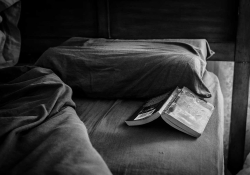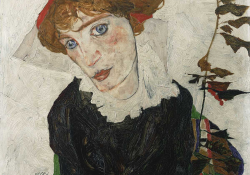The Gardens of Kammer Castle

Ride the tram through a wintry Budapest in this surreal dreamscape.
She feels neither pain nor sadness, being certain that it’s a dream. After the light childbirth that passed almost without her noticing, the newborn, a fat waxen doll, is lying by her side. The midwife’s shrill voice snaps: “You must pretend it’s alive!” She knows that this lie might be dangerous, but at this stage she doesn’t give much heed to danger or death. Scattered on the bed that might just as well be a table are the requisites of an interrupted breakfast, covered with a white cloth. She wants to cut a slice of bread but the knife runs into the waxen forehead and a short, deep cut opens exactly above the bridge of the nose. She tries to smooth out the wound with her fingers but can’t, although there is no trace of blood. She knows that the midwife’s instruction, to pretend it’s alive, only serves to provide evidence for a false allegation to be made at a subsequent trial, that she killed her child. The maternity nurse comes back and exclaims three times—“How cutely it wobbles!”—accompanying each cry with claps of her hand. Her protest is subdued into a mumble.
All this happened in her dream as she knows well, but still, she is shaken by remorse. Cutting through the dirty fog and the city drenched in cold sweat, she was going to the swimming pool. A cottonwool vapor covered the water surface, the predatory globe-faces of swimmers popped up from it and were immediately submerged. She vaguely remembered that her husband was coming to the pool too, but they didn’t make an appointment. When she turned over, as usual, from backstroke to breaststroke, a broad horizon opened. In the diffuse light of uncertain origin, on the side of the pool a greenish-blue stretch of lawn met an immaculate water surface of only slightly different hue. From the left, scrupulously following the lawn’s edge, a fawn-colored animal appeared, trotting dog-fashion. Because of its gentleness of movement, it crossed her mind that it might have rabies.
In the windowless hall only one of the three hair dryers was working. She watched with chagrin as an almost completely bald old woman was basking in its warmth. She took a few steps toward the changing room but when she returned, a young man was already queuing up before her. She made an acid remark on the old woman’s selfishness. The young man took it in jest, this made her feel ashamed, so she tried to redress it by striking up a casual conversation. The old woman shuffled out from under the hood and her place was taken by the young man. Her frustration dissolved the lightness of their earlier chat, but she was soon consoled, for in a few moments the man—as though inviting her to an intoxicating liquor—gave up to her the still-working hairdryer. He hurried out to the bench by the pool and sat down, facing her. By that time the mist had lifted in the weak sunlight. The man was sunbathing with legs crossed, arms hanging, face thrust upward. All of a sudden—this made her cry out in anguish, as she could almost have foretold it—he fished a white handkerchief from his pocket to wipe off the blood oozing from his nose, eyes, and mouth. She saw the rapidly spreading stain from so close as though she herself were holding the cloth that the young man lifted now and again to his eyes, blinking fast. She sprang up from under the hood, freeing herself from the threads of the gaze lifted on her; she put on her cap in front of the mirror and tilted it to the side as always, carefully arranging her hair.
On the street she walked into the earlier soggy mist. As if it were April or at least an April whim of the weather in January, a heavy drizzle fell from the darkened sky. No trace of sunlight. The dripping streets were vibrating in lurid neon light, lighting rattled on in all the shops. There was a thick crowd in the tram station: the last tram from the Pest side must have passed quite a while ago. She crossed the street to the station. Only after long minutes of waiting did she learn that it was hopeless to get the bus from there, the bus stop had been moved more than half a year ago. She was informed by the architect wearing his unfailing hat, who made his way to her through the crowd. His appearance didn’t surprise her, he had been on her mind for days. They had broken up recently, after seven years of love. Seeing him she grew so weak that he offered to walk her home. She couldn’t remember where she bought so many tropical fruits on her way from the pool, but in any case she was already carrying two heavy shopping bags besides her backpack. He let her struggle under her load, moreover, he seemed to deliberately quicken his pace. She almost had to run to keep up with him across the tracks, puddles, spits on the asphalt, across mists and underpasses, to the station from where the suburban trains started. When at last they could take some rest in the empty carriage where the slashed upholstery reminded her of the place’s—and the world’s—proper destination, she told him only as much that she had dreamt something frightful. Or at least she hoped she had only dreamt it, because she had a clear memory of it happening. His face was unapproachable, she understood that he didn’t want to hear the details, but she felt a compulsion all the same to share her nightmare with him, because it touched the two of them. There was a shade of terror in the carriage’s artificial light. She didn’t dare look at his face for fear she would spot a cut or scratch. The cold light looked like the electric bulbs of operating theaters or labor rooms, reflected on the white tiles. They were sitting on the narrow seat, within one another’s breathing space. There was something deadly in the architect’s stiffness, his sullen look fixed before him was completely at odds with his face’s former, childlike, and ceaselessly demanding, permanent being-there. Still, she breathed in his presence like those creatures who linger on, sipping one another’s energy, in the empty carriages running outside time.
In the elevator at home she often met the physician living upstairs, who once bumped into her on one of her first meetings with K., many years ago, when her husband was away. She and K. were just stepping out on the street, with the love-fever on their faces, arm in arm. Soon afterward—she can vividly recall the warm afternoon—she was watering the lawn in the condominium’s garden in her long sleeveless dressing gown when on her bare skin she felt the eyes of the physician peering through the venetian blinds. The watering didn’t take long—ten minutes, perhaps a quarter of an hour—but by the time she was done that peering covered her whole body like a viscous film. It permeated her like a substance, showering couldn’t wash it off. For years her husband had suffered from fits of suffocation. His disease had nothing to do with the season, diet, or with the pills he swallowed by the handful. On the night after the watering she was woken by his moans. Driven by the specter of the swollen eyes, bulging ears, lips distorted into sausages, she ran upstairs to the doctor for help. The man didn’t take any money but panted into her face that he loved her. She looked at the paling, most likely razor-cold lips and her mouth went all cold, even her tongue clinked like an icicle. The fits of edema recurred a few times. She would suffer the physician’s declarations like a nurse the exhibitionism of a patient.
She knew the man, the erstwhile authority of librarianship, whose serious heart condition was an open secret among those in the trade but who, notwithstanding rumors of his imminent death, was not only alive but engaged in all kinds of affairs.
“Merry Christmas, darling!” she heard from the platform. The withering woman turned from the steps of the carriage back to a tearful, dark-eyed, tall, old man and, throwing her arms around his neck, kissed him on the mouth. She knew the man, the erstwhile authority of librarianship, whose serious heart condition was an open secret among those in the trade but who, notwithstanding rumors of his imminent death, was not only alive but engaged in all kinds of affairs. When the train started, the arch-librarian’s orphaned girlfriend sat down at one end of the carriage and, kicking off her shoes, rubbed her feet against one another. At a sudden brake one shoe rolled on the floor and she, struggling to the door behind the architect with her heavy shopping bags, almost tripped over it.
They were already walking down a dank corridor with her former lover but, without turning round, she was still eyeing the woman who traveled on. Neither her stare nor the presence of the other passengers would disturb the woman in her fly-like routine of hygiene. They could hardly make way on the steep, icy slope starting at the corridor’s end. On top of it all, her eyelid was jerking in an ever more agitated tremor, as if a large flock of white birds were flying inches from her face. Small wonder she kept tripping, as though she were guilty of overlooking something and compelled to repeat it. Perhaps it had to do with Christmas, the feast of love, with the waxen doll, the bitter fruit of their love. When they had struggled past the frozen stretch of the road, she said goodbye to the architect. She stopped for a few moments by the fountain, drained for the winter: the rain falling incessantly from the heavy clouds glazed its walls with a silvery glitter.
After long waiting she finally got on the last carriage of the tram. She found a seat and sat down, placing her shopping bags on her lap. She considered emptying the contents of the one into the other when she noticed that the outside pocket of her backpack was empty: her wallet had probably been stolen. She jumped up and skipped out between the closing doors. But in such an infelicitous way that, although she landed safe on her feet, the metal frame fastening the doors tore up the skin on her thumb. There she was in the tram stop again, with a bleeding hand. Still, for one brief moment she felt relieved, but she had only managed to get rid of the physical weight pulling down her shoulders: her swimming things and the fruits she was just about to repack were left on the tram. She decided to have her thumb bandaged in the nearby doctor’s office. The assistant was just airing the office, Doctor Vajk was standing in the hall, as if expecting her. With compassionate tss-tss-ing he asked where and how the accident happened. Her finger was wounded by the door’s edge, she said, getting entangled in her convoluted sentences, when she jumped off the tram because she realized that all her money and documents had been stolen—before the incident—as a result of which her backpack was left on the tram, in addition to the fruit. As it turned out, her report was unintelligible for two reasons. For one thing, she was ashamed to admit that she was on the point of losing all her things because of a broken heart, and for another, as she looked at the doctor’s dark red tresses she realized that he dyed, and probably even undulated, his thinning hair. Armed with disinfectant and bandages, he led her to the sink in one corner of the office, and in the lamplight directed the spray at her thumb. The burning pain made her cry out and, dropping her head on the doctor’s shoulder, she fell sideways against him. The assistant’s scandalized look scorched her back, but not even this stopped her from pressing her lips, opening from the sharp pain, on the doctor’s coat and biting it, however gently, incomprehensibly even to herself. She was sure Dr. Vajk felt it and that the assistant saw the whole scene in the mirror, because neither of them said anything when she loudly thanked them for dressing the wound.
As it turned out, her report was unintelligible for two reasons. For one thing, she was ashamed to admit that she was on the point of losing all her things because of a broken heart, and for another, as she looked at the doctor’s dark red tresses she realized that he dyed, and probably even undulated, his thinning hair.
The icy wind that in the meantime started blowing froze the drizzle onto the asphalt; still, she decided she would not wait for the infrequent buses in the nearby stop but walk a while and take the tram in the same station where she got off on her way here. Leaning against a lamppost that bore a litter bin, there was a man in a trench coat holding one trekking boot, who detached himself from the post when she got near. The lopsided face and the deep-set eyes looked familiar, but his whole outfit was so unlike normal streetwear that she decided she couldn’t possibly know him and turned her back. The icy drizzle gave way to slushy snowfall, there were no pedestrians in sight; it seemed that tram traffic had been blocked beyond hope. She dimly remembered that not long ago, in the window of the bookshop across the street she had spotted the album she had wanted to buy for weeks. On its cover there was a reproduction of a landscape entitled Allée in the Gardens of Kammer Castle. In the image the path leading to the red-and-yellow building was as deserted as the street whose dismal length now made her shudder. Yet in the painting the trees lining the path, reaching up to the sky and showing off their thick bluish branches like fearful roots, couldn’t hide the rampant green of the foliage, however pushed into the background, or the dense tree crowns so close to the sky. She heard a click and glanced back. The man in the trench coat, detaching himself from the post, started out in her direction. This was just about enough for a last, decisive motivation to walk back to the bookshop; from the curbside she stepped down on the road. A long loud screech of brakes startled her, a young man with earrings leaned out of the car window and threw at her a string of obscene insults.
On the fourth floor above the bookshop used to live the erstwhile mathematician who was so savagely beaten up by the police for his illegal religion classes that he went deaf in one ear. He had told her that once in a dream he was making his way to a lit-up building in the back of a garden immersed in darkness, obeying a relentlessly repeated call from the house. But he dared not take the name of the one summoning him, although in the course of their conversations he always spoke of this dream profoundly shaken. In the unlit shopwindow she couldn’t see the book with the lakeside castle on its cover, which brought the mathematician’s stirring dream to her mind. She pressed her forehead to the glass, trying to penetrate the darkness, but couldn’t see a single book, let alone the album. The thought that the shop was not merely refurbished but transformed into something else saddened her. She could make out the silhouettes of piles of bricks, buckets, a splayed ladder, and, in the back of the room, a half-unpacked slot machine.
The only lighted place was the tram stop she now walked back to. Like the faces in the pool, rising from the vapor and submerged again, the spheres of car headlamps appeared and drew closer, spraying her sideways with a few tiny drops of luminosity. She was sorry for not having taken notes of her conversations with the mathematician at the time, and for having never invited him to her home. For all her reserve with which she understood to relate to his unkemptness and deafness. Her newfangled self-reproach obviously didn’t extend to the man in the trench coat who, forlorn, hugging one boot, took a few steps in her direction. He doesn’t want to make a proposal but to ask that we swap, she said to herself in alarm: perhaps he would offer her his seedy trench coat, the mud sticking to it, or his wretched social position. The approaching tram saved her from the pangs of turning down the man’s advances; she collapsed, exhausted, on a safe seat near an old man and loosened the belt of her coat. The man in the trench coat, his plan gone up in smoke, withdrew to the back of the carriage. Looking indomitably ahead she noticed that behind the smoked plexiglass of the driver’s cabin sat the bearded driver who had been the witness of her passionate encounters with the architect during her husband’s long absences, and who had always seemed to sympathize. Whenever he saw them on the street, saying goodbye in front of the house, or during their evening walks, he threw the side window open and greeted loudly, waving his hand. Last time, when he started from the terminus with her as the only passenger, he opened the door and asked rebukingly why she was not traveling with the gentleman. The decrepit old man next to whom she plopped down a few moments ago, safely out of reach for the man in the trench coat, was meticulously arranging his growing heaps of documents, steadily pushing her outward on her seat. During a turn the tram took, which she used for slipping back, he even pushed her away with one hand; his nails were broken, black-rimmed. She answered by giving him a push, at which the old man jerked away with a whimper and pretended to be slipping down to the floor. Fortunately, he was only preparing to get off and, scraping up his belongings deposited under the seat, flumped down to the door. The driver probably followed their combat in the reverse mirror, for he opened the cabin door so she could hear the announcements on the radio. Although the announcer’s voice was at times stifled by the screeches of the tracks, she could discern in the cacophony of voices that the evening’s theater show—for which her husband had bought their tickets long in advance—would be canceled due to prolonged illness.
The tram was overrun by members of the workers’ militia in gray uniforms, aging, overweight men all, pushing life-size dummies in front of themselves. Get up and walk to the front! a mustachioed one shouted.
There were only a few stops left now, then they reached the military barracks. The tram was overrun by members of the workers’ militia in gray uniforms, aging, overweight men all, pushing life-size dummies in front of themselves. Get up and walk to the front! a mustachioed one shouted. For a second she believed the order touched the passengers: her heart gave strong blows to her chest box. But the others didn’t react, so with a sigh of relief she let her inert body be shaken along by the tram. The militiamen were giggling like a bunch of children on a school trip. Their playful order was obviously only directed at the man-size parcels tied with string and propped up against the tram walls. She couldn’t imagine where they were being taken, although she had no doubts about their destiny. Would they be pushed off the racing tram, or executed immediately after getting off? Beneath the brown paper the heads, shoulders, fractured limbs showed through, subdued. In the meantime, out of boredom or forced by schedule, the driver sped up, forgetting that he was supposed to halt, among others, in the stop where she wanted to get off. Yet the thing was not entirely against her will, for one thing, because she trusted the driver and, for another, because suddenly she heard soaring violin music.
The sound of the violin came from the fingers of the man clutching a handhold above her. She would never have expected to see the love of her teens with the thick tresses, whom she used to daydream about so much when she worked in a library for a month as a school practitioner. She wanted to pull out her mirror to check if she was beautiful enough but couldn’t find the backpack she held in her lap a moment ago. She looked at her reflection in the inviting black window, at the dense patches of shadow falling on her face. The man’s gaze barely halted on her, brushing past in the next instant as if he too were looking for the lost bag. Changing direction, at once his eyes stopped on the floor where a woman was standing in fishnet stockings, without holding on, very provocatively. The high-heeled patent-leather pumps, the ostentatious stockings, the tight, side-cut skirt brought out the contours of her legs. She stood straddle-legged, pretending to hold her balance, but every so often had to take a small step to the side at a jolt, a quarter- or a half-turn, as if dancing. She could only have used her right hand, because of the cigarette holder in her left. She looked around: Could somebody light my cigarette? A bluish-yellow flame was already dancing on the hand of the man above her. Thank you, cooed the woman on whose face she now spotted a deep scar running to her ear. Her thank-you, the first syllable of which she stressed overmuch, adding the rest in a whisper but well audibly, was at once inviting and rejecting. As though she were saying in a pleasantly teasing voice, The things you imagine! This lit up the desire in every passenger to be near her and touch her leg in the fishnet stocking, torn above the knee and clumsily stitched together. It didn’t surprise her in the least that the man kneeled in front of the woman; her mouth went dry, she was so inebriated by the thought of consummation. The woman faltered and, hypnotized, sank to her knees in front of him. So they reached the terminus.
Her thank-you, the first syllable of which she stressed overmuch, adding the rest in a whisper but well audibly, was at once inviting and rejecting. As though she were saying in a pleasantly teasing voice, The things you imagine!
She could have wagered that she had never been there, although in reality she was by no means a stranger to the place. From the snowfall filling the square the half-restored yellow building of the post office rose triumphantly. Under heavy nylon sheets on the scaffolding that traced the line of the floors, in the floodlight directed on them, the men were working with tense dedication in spite of the late hour. Others were probably working inside the building, because the gigantic shadow of their movements adhered to the gasping plastic foil tacked to the windowsills before sliding into the depths. The pedestrians were skidding and laughing in the thick snowfall under the trees’ heavy white foliage. She tried to force open the tram doors, but at her pulls the whole vehicle started plunging. Before she got submerged in the landscape for good, however, somebody—probably the driver himself who had dozed off and was now awakened—with a few competent moves set the vehicle back on the tracks and, leaving the terminus behind, started descending again, to the stops omitted deliberately or by accident.
The door of their apartment is open. Just like in the morning, the lights are on everywhere. The shoe prints on the wooden floor show that they have guests. In the kitchen she sees the architect, in one hand he holds a wreath of bright red roses. Then two figures in white coats, in whom she recognizes Dr. Vajk and the physician from upstairs. They pretend to be at a forensic investigation: with a rigid tape measure that emits harp sounds when plucked, they take the length and width of the kitchen, of every piece of furniture, and in the end trace the contours of a prostrate body on the tiles. Driven by her lacerating headache she pulls out drawer after drawer looking for some painkiller. But the others pay her no attention, they look, stick their hands, even walk through her, as though her body were liquid glass. They only notice her when, giving in to the weight of her dream, she lies down inside the contour drawn on the floor. Then the two doctors try to cover her. She starts awake at the touch of linen. Gathering all her strength, she throws off the light blanket and, jumping to her feet, switches on the light. On the clock it is half past five, the usual January fog outside. For an instant she looks at the vase on her nightstand. In her mind she goes over her tasks. She decides that a swimming session can be squeezed into the morning.
Translation from the Hungarian
By Erika Mihálycsa
Editorial note: From A megteveszto kulseju vendeg (Thedeceptive-looking guest: My auto-biographies, 2007).















